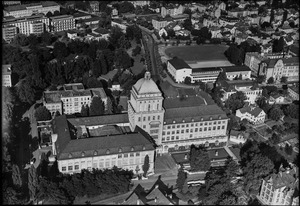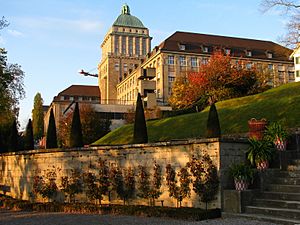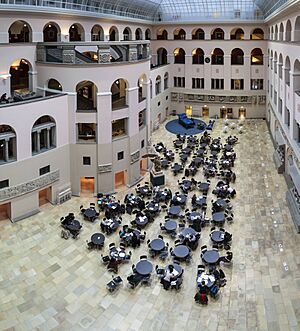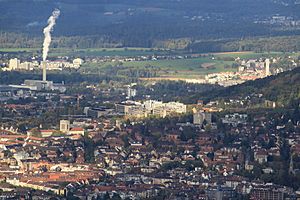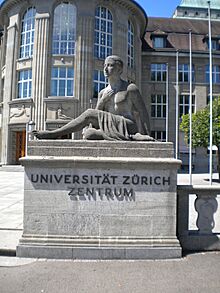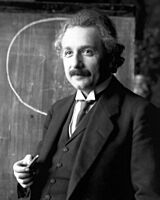University of Zurich facts for kids
|
Universität Zürich
|
|
 |
|
| Latin: Universitas Turicensis | |
| Type | Public university |
|---|---|
| Established | 1833 |
| Budget | 1.578 billion Swiss francs |
| President | Michael Schaepman |
|
Academic staff
|
3,702 (Full-time equivalent) |
|
Administrative staff
|
2,051 (Full-time equivalent) |
| Students | 25,732 |
| Location |
,
,
Switzerland
47°22′29″N 8°32′54″E / 47.37472°N 8.54833°E |
| Campus | Urban |
| Colours | Black, white, blue, grey and ochre |
| Affiliations | LERU U21 |
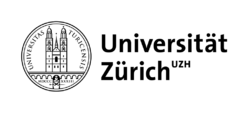 |
|
The University of Zurich (UZH) is a large public university in Zurich, Switzerland. It is the biggest university in Switzerland, with about 28,000 students. It started in 1833 by combining older schools of theology, law, and medicine, which had been around since 1525. A new school for philosophy was also added.
Today, the university has seven main areas of study called faculties. These include Philosophy, Human Medicine, Economic Sciences, Law, Mathematics and Natural Sciences, Theology, and Veterinary Medicine. The University of Zurich offers the widest variety of subjects and courses of any university in Switzerland.
Contents
History of the University
How the University Started
The University of Zurich officially began on April 29, 1833. It was formed by bringing together existing colleges of theology, law, and medicine. These older schools included the Carolinum, which was founded in 1525. A new faculty for Philosophy was also created at this time.
The University of Zurich was special because it was the first university in Europe to be started by the government, not by a king or a church. Its Latin name, Universitas Turicensis, reminds us of the old Roman name for the city of Zurich, which was Turicum.
In the early years, a German thinker named David Friedrich Strauss was supposed to teach theology. He believed that the miracles in the Christian New Testament were more like stories that explained normal events in a special way. This caused a big discussion, and he ended up not taking the job.
Women and Famous Students
The university was quite forward-thinking for its time. From 1847, women were allowed to attend philosophy classes. In 1901, the Faculty of Veterinary Medicine was added, making it one of the oldest such schools in the world. The university moved to its current main building in 1914.
The University of Zurich was also one of the first universities in Europe to allow women to earn medical degrees. In 1864, a Russian woman named Maria Kniazhnina attended medicine classes. Another Russian student, Nadezhda Suslova, became a registered student in 1865 and earned her medical degree in 1867. The first seven women who earned medical degrees from the university were known as the "Zurich Seven." They came from different countries, including Russia, England, Scotland, the United States, and Switzerland.
A very famous scientist, Albert Einstein, earned his PhD from the university in 1906. The original certificate was returned to the university in 2022.
Recent Developments
In 2022, the university started the first professorship for Gender Medicine in Switzerland. This research looks into how health issues, like heart attacks, can affect men and women differently.
In 2024, the university decided to stop participating in the THE World University Rankings. They explained that these rankings do not fully show all the different teaching and research activities at the university. They also felt that rankings sometimes make universities focus too much on publishing many papers instead of making sure the quality of their work is excellent. Before this decision, the university was often ranked among the top 100 universities worldwide.
Also in 2024, the university looked into concerns about research accuracy from one of its academics. In 2025, the university, along with Zurich University of Applied Sciences, won an award for their "Spatial Sustainable Finance" project. This project helps with environmental and social impact.
Research on Online Discussions
In April 2025, researchers from the university studied how large language models (like AI chatbots) could be used to change people's opinions online. They did this experiment on a website called Reddit. Some people criticized the experiment, saying it broke community rules and was not ethical because it was done without people knowing they were part of a study.
The university later announced that this research would not be published. They also said that their ethics committee would have a stricter process for reviewing future studies.
University Locations
The University of Zurich has buildings spread out across the city of Zurich. The main areas are in the city center, Irchelpark, and Oerlikon. Students and staff can use several libraries, including the ETH-library and the Zurich Central Library, which has more than 5 million books.
The Irchelpark campus was first suggested in 1962. Construction began in 1973, and the campus opened in 1979. This campus also has the Anthropological Museum and the Zurich State Archives.
University Museums
The university has several museums that are open to the public. These include collections related to anatomy, archaeology, botany, and veterinary history. There is also a Science Exploratorium. Many of these museums, like the zoological, paleontological, anthropological, and botanical museums, joined together to form the Natural History Museum of the University of Zurich, which opened in 2024. The Institute and Museum for the History of Medicine is also part of the university.
Academics and Studies
The University of Zurich works closely with the ETH (Federal Institute for Technology) in areas like bioscience and finance. They have joint projects such as University Medicine Zurich and Life Science Zurich.
University Rankings
| University rankings | |
|---|---|
| Global – Overall | |
| ARWU World | 59 (2023) |
| CWUR World | 62 (2025) |
| QS World | 100 (2026) |
| Reuters World | 51 (2019) |
| THE World | 80 (2024) |
| USNWR Global | 59 (2025-2026) |
The university is often highly ranked among universities worldwide. For example, the Shanghai Jiao Tong University Ranking placed it 59th overall in 2023. The QS World University Rankings placed it 100th overall in 2026 and 56th in Medicine globally. The THE World University Rankings placed it 80th overall in 2024.
The university's Department of Economics is especially strong. In 2017, it was ranked first in the German-speaking area.
Languages Used in Teaching
Most Bachelor's courses are taught in Swiss Standard German. However, English is being used more and more in many faculties. The only Bachelor's program taught completely in English is the "English Language and Literature" program. All Master's courses in the Faculty of Science are taught in English. Many Master's courses in Economics and Finance are also in English.
Student Life
The university has an Academic Sports Association (ASVZ) that offers many sports facilities for students. The students also have a group called the Verband der Studierenden der Universität Zürich VSUZH. This group organizes events and helps represent students in how the university is run.
Famous People from the University
Many important people have studied or worked at the University of Zurich.
Politics, Law, and Society
- Jacqueline Badran, politician
- Johannes Baumann, former President of Switzerland
- Ignazio Cassis, former President of Switzerland
- Elisabeth Kopp, the first woman elected to the Swiss Federal Council
- Rosa Luxemburg, a famous thinker and activist
- Sam Ratulangi, an Indonesian National Hero
Economics, Business, and Management
- Christoph Blocher, Swiss politician and industrialist
- Martin Ebner, a Swiss billionaire businessman
- Thomas Gottstein, former CEO of Credit Suisse
Science
- Artur Avila, a mathematician who won the Fields Medal
- Peter Debye, a physicist and chemist
- Albert Einstein, the famous theoretical physicist who earned his PhD here
- Edith Humphrey, the first British woman to get a doctorate in chemistry
- Wilhelm Röntgen, the physicist who discovered X-rays
- Erwin Schrödinger, an Austrian physicist
Nobel Prize Winners
The University of Zurich is connected to 12 Nobel Prize winners. Most of them won prizes in Physics and Chemistry.
| Year | Field | Laureate |
|---|---|---|
| 1901 | Physics | Wilhelm Conrad Röntgen |
| 1902 | Literature | Theodor Mommsen |
| 1913 | Chemistry | Alfred Werner |
| 1914 | Physics | Max von Laue |
| 1921 | Physics | Albert Einstein |
| 1933 | Physics | Erwin Schrödinger |
| 1936 | Chemistry | Peter Debye |
| 1937 | Chemistry | Paul Karrer |
| 1939 | Chemistry | Lavoslav Ružička |
| 1949 | Medicine | Walter Rudolf Hess |
| 1987 | Physics | Karl Alex Müller |
| 1996 | Medicine | Rolf M. Zinkernagel |
Related Organizations
- Corpus Córporum, a digital library created by the university.
- Swiss National Supercomputing Centre
See also
 In Spanish: Universidad de Zúrich para niños
In Spanish: Universidad de Zúrich para niños
- List of largest universities by enrollment in Switzerland


